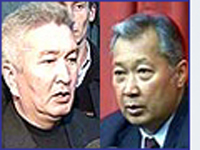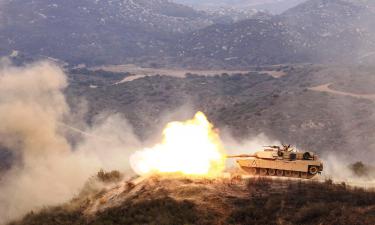A new war between North and South
 Acting Prime Minister of Kyrgystan Kurmanbek Bakiev and Felix Kulov, Bakiev’s main rival in the upcoming presidential election, have signed an election agreement. Now it seems obvious that Mr. Bakiev has got every chance to win the election on July 10th.
Acting Prime Minister of Kyrgystan Kurmanbek Bakiev and Felix Kulov, Bakiev’s main rival in the upcoming presidential election, have signed an election agreement. Now it seems obvious that Mr. Bakiev has got every chance to win the election on July 10th.
In his turn, Mr. Bakiev made a commitment to appoint Mr. Kulov to the position of prime minister. The South-led Kyrgyz revolution did not result in victory over the North. Shortly after the ousting of Askar Akayev, Felix Kulov, a popular anti-Akayev politician representing the opposition elite from the North, put up lots of competition to the South. The competition between the two top contenders for the Kyrgyz presidency had been growing from day one of the revolution.
Both the contenders announced their candidacies by the end of April. In other words, both sides refused to compromise. The scenario would have lead to a wider rift between the North and South. Mr. Kulov was supported by other opposition leaders who were ready to withdraw their candidacies in his favor. In the meantime, Mr. Bakiev’s potential for putting influence on power struggle is strong enough for getting the upper hand during the election. Had Mr. Bakiev won the election, Mr. Kulov’s supporters could have accused him of rigging it. A fresh wave of public protests could have triggered another round of political unrest. On the other hand, the South could have objected to Mr. Kulov’s victory in a similar manner. In other words, a long period of political destabilization featuring economic crisis and a potential collapse of economy would have arisen out of failure to reach an agreement.
Given the above “prospects,” both the threats of Islamization and disintegration of the state could have become a reality in Kyrgyzstan. Taking into account that many participants of the bloody mayhem in Andijan fled to Kyrgyzstan, the recent events in Uzbekistan could have encouraged the Islamic radicals to take action
Neither the Kyrgyz elite interested in stabilization and a sustainable business environment, nor Russia and the West would gain any benefits from the such a scenario.
The top contenders eventually managed to reach an agreement. There are three main reasons behind Mr. Kulov’s refusal to run for president on his own. First, he could have followed suit of Mr. Akaev if the South had refused to accept his win. Second, a growing confrontation could have threatened his life. Besides, Mr. Kulov’s performance on the political scene had been pretty lame for the last two months. As a result, the precious time has been lost and his chances for victory now look rather slim.
The agreement between Kurmanbek Bakiev and Felix Kulov on consolidation of their efforts for conducting presidential campaign in Kyrgyzstan was signed in presence of the Chairwoman of the Constitutional Court Mrs. Bayekova, the Chairman of the Supreme Court Mr. Osmonov, and Speaker of Parliament Mr. Tekebaev. The presence of the other branches of power should guarantee the fulfillment of obligations taken up by both sides. In accordance with the agreement, Mr. Kulov will withdraw his candidacy and will be appointed first vice prime minister. He will turn into acting head of the state because Mr. Bakiev will go on leave for the whole period of election campaign. Mr. Kulov will be appointed prime minister if Mr. Bakiev wins the election. The agreement also provides implementation of a constitutional reform aimed at significantly restricting president’s powers. The reform also aims to give more powers to the head of government.
The government should be formed by prime minister, it should get the approval by the president and parliament. The prime minister will also appoint the heads of local state administrations (upon agreement by the president). The prime minister will have the right to appoint the heads of administrative ministries independently. Should he or she resign, the president will resign too.
The compromise between the representatives of the North and South has been reached for the first time in history of modern Kyrgyzstan. The constitutional reform should bring out a redistribution of powers for the benefit of the prime minister who will be a real political figure in power as opposed to his predecessors. The format of the agreement does not allow either of the sides to back out of the deal. The new balance of power looks quite fragile due to a longstanding legacy of authoritarian rule in Central Asia and decades of confrontation between the North and South unlikely to be overcome by means of an agreement.
Subscribe to Pravda.Ru Telegram channel, Facebook, RSS!





